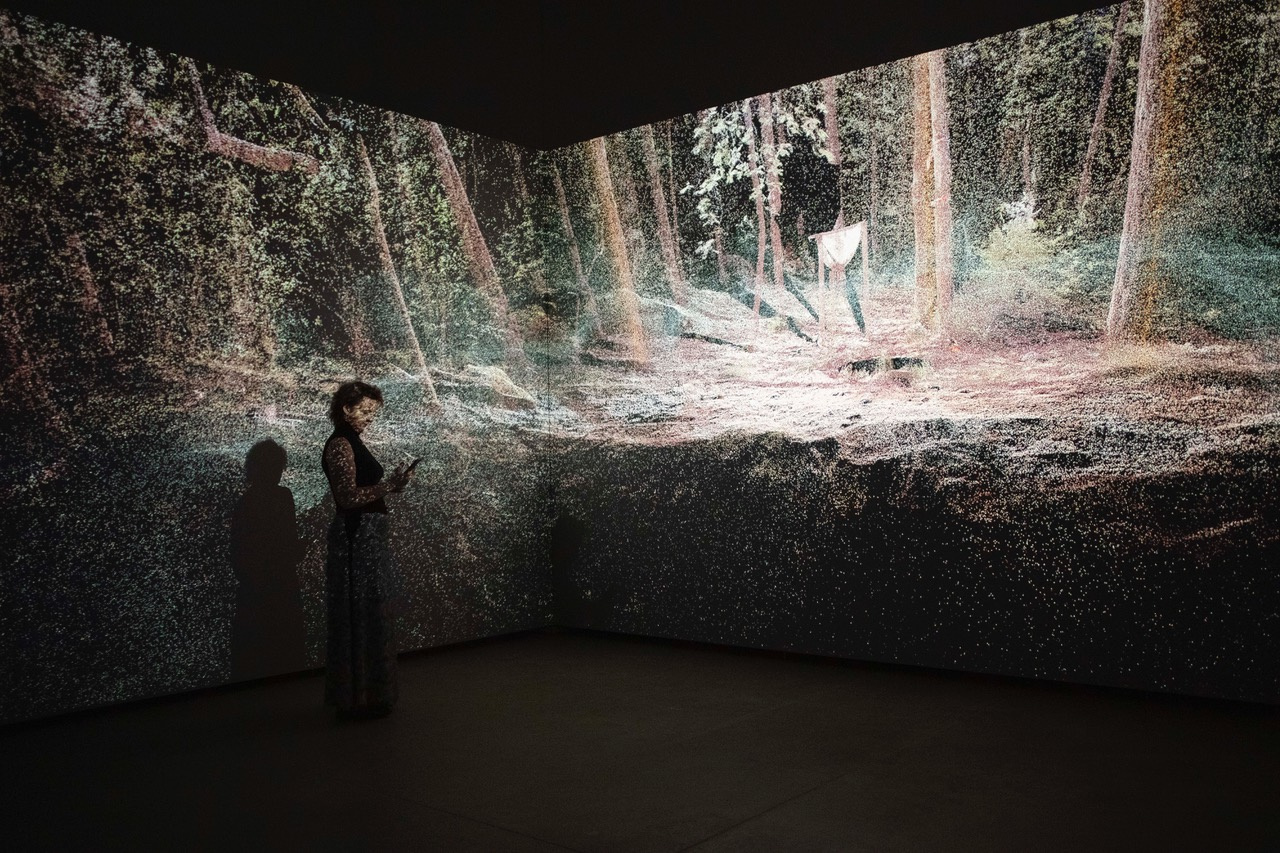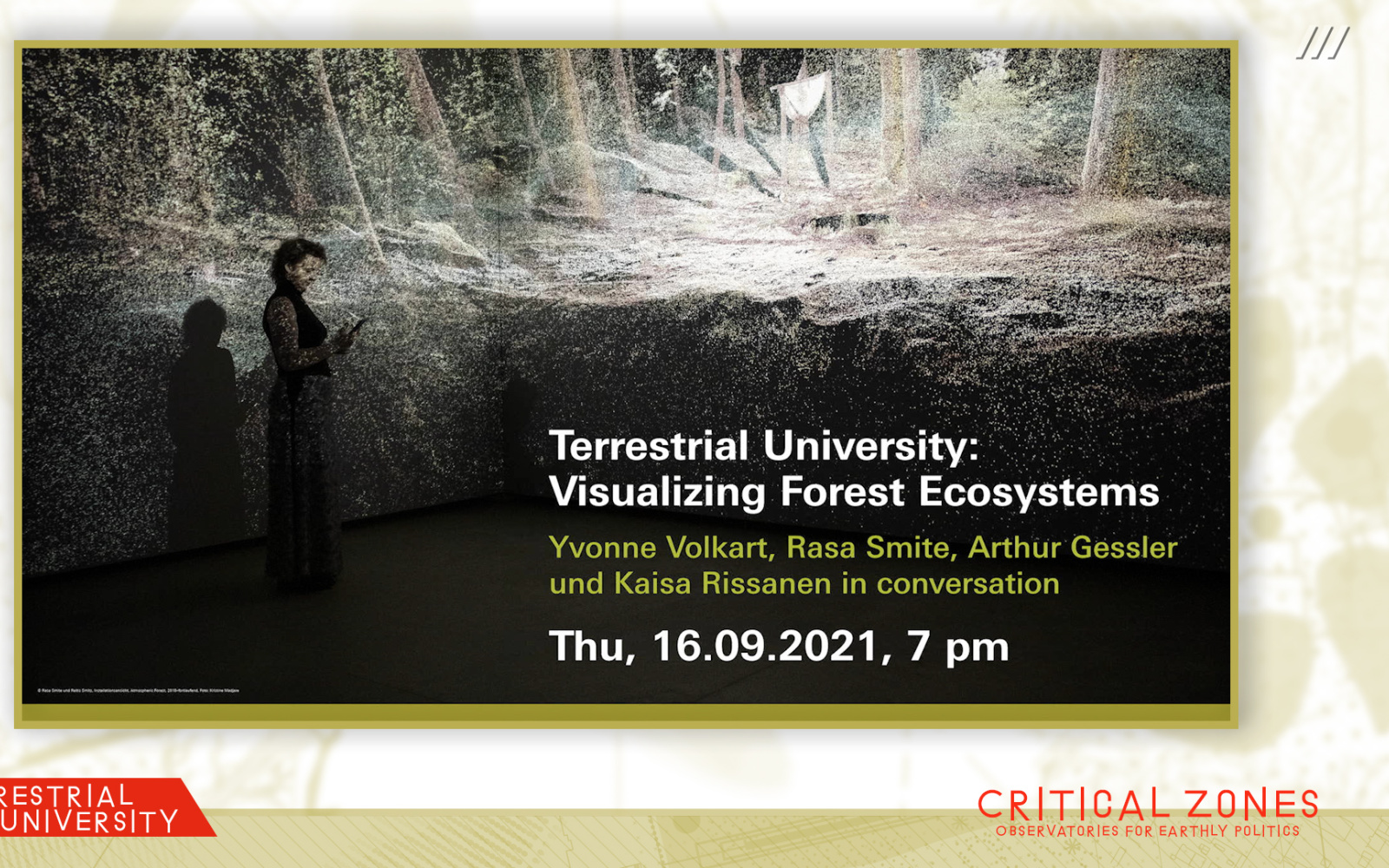Terrestrial University: Visualizing Forest Ecosystems
Yvonne Volkart, Rasa Smite, Arthur Gessler and Kaisa Rissanen in conversation
Thu, September 16, 2021 7:00 pm CEST
- Location
- Online
- Media Theater
- Language
- English
On-site registration via Luca app – limited number of participants!
What are volatile particles? How can we measure and feel them? And why do we experience a fragrant forest as a consequence of climate heating?
Terrestrial University: Visualizing Forest Ecosystems
In their 3D installation »Atmospheric Forest«, which is on show in the »Critical Zones« exhibition, artists Rasa Smite and Raitis Smits focus on the phenomenon of volatile emissions from trees and their visualization. In the course of their collaboration with the Swiss Federal Institute of Forest Snow and Landscape Research (WSL), they learned that under the regime of climate change, certain trees not only transform CO2 into oxygen, they also emit various gases into the atmosphere: forests breathe. Based on this artwork, this issue of »Terrestrial University« engages with in-depth scientific and artistic research on fragrant forests, taking the Pfyn forest in the Swiss Alps as a case study. This 10,000-year-old forest in the Valais, southwestern Switzerland, is unique: its state of crisis has been caused by the local aluminum industry and by drought exacerbated by climate change over the past 100 years. As one of the first long-term outdoor laboratories, the Pfyn forest has been closely monitored for more than 20 years.
The project partners talk about tools, methods, and the scale of fragrant forests affecting climate change together with the question of how art can translate the invisible and alarming interactions between the forest and atmospheric ecosystems into an experienceable environment confronting people with the imperative necessity of system change.
»Atmospheric Forest« is part of the »Ecodata–Ecomedia–Ecoaesthetics« research project (2017–2021), which is carried out by Yvonne Volkart (lead), Marcus Maeder, Rasa Smite, and Aline Veillat in collaboration with Arthur Gessler, Christian Ginzler, Andreas Rigling, the Swiss Federal Institute for Forest, Snow and Landscape Research (WSL), and Kaisa Rissanen, University of Helsinki and funded by the Swiss National Science Foundation and hosted by the Academy of Art and Design (FHNW) Basel.
Yvonne Volkart was leading the Swiss National Science Foundation (SNSF) funded artistic reserch project »Ecodata-Ecomedia-Ecoaesthetics« (2017–2020), hosted by the Institute of Aesthetics Practice and Theory at HGK FHNW Basel, Switzerland. She lectures art and media theory at the Academy of Art and Design FHNW and the Zurich University of the Arts ZHdK. In collaboration with Sabine Himmelsbach (HeK, Basel) and Karin Ohlenschläger (LABoral, Gijon) she co-curated the exhibition and book project »Eco-Visionaries. Art, Architecture and New Media After the Anthropocene Anthropocene« (2018). She co-organized the conference »seeds & soil« at Centre Culturel Suisse Paris (with Claire Hoffmann, 2019). Completed SNF-research projects include: »Times of Waste« (2015–2018). From 2009 to 2012 Volkart was co-curator at the Shedhalle Zürich. She writes regularly for Springerin.
Rasa Smite is an artist and researcher, working on the edge of art, science, and emerging technologies. She is co-founder of RIXC Center for New Media Culture in Riga, and co-curator of RIXC Art and Science festivals. She holds a PhD; her thesis »Creative Networks« (2011) has been published by the The Amsterdam Institute for Network Cultures. She lectures on topics of networked media and art-science, techno-ecologies and sonic immersions, and artistic research methodologies at the Academy of Art and Design FHNW in Basel, Liepaja University in Latvia, HfG in Karlsruhe, and ACT at MIT in Boston. In her artistic practice, Rasa Smite works together with Raitis Smits creating visionary and networked 'techno-ecological' artworks, such as »Talk to Me« – human-plant communication, »Biotricity« on poetics of green energy, and »Atmospheric Forest« visualizing the interactions between the forest and atmospheric ecosystems, which have been shown in ZKM, HeK, Ars Electronica, Venice Architecture Biennale, Futurium Museum in Berlin, and other venues in Europe, US, Canada.
Prof. Dr. Arthur Gessler is Director of the Long-term Forest Ecosystem Research (LWF), and Group Leader Forest Growth at the Swiss Federal Institute for Forest, Snow and Landscape Research WSL, Birmensdorf, Switzerland. His research is geared towards understanding the processes that drive and regulate biogeochemical cycles, biotic interactions, and biodiversity-ecosystem functioning at different scales. Only with this understanding we can assess and predict shifts in the function of ecosystems and landscapes subjected to fundamental changes in the prevailing environmental conditions (i.e. climate and land use). Arthur Gessler is also is Adjunct Professor ETH Zurich.
Kaisa Rissanen is a researcher with a background in forest sciences and ecosystem-atmosphere interactions. Her Ph.D. research focused on the interplay between tree physiology, tree defense and the emissions of volatile organic compounds (VOCs) from different parts of conifer trees. As a part of this research, she collaborated with the Swiss Federal Institute for Forest, Snow and Landscape research (WSL). Currently she is a post-doctoral researcher at Université du Québec à Montréal in Canada. Her broader interests are related to tree physiology: how trees work, how their environment affects their functions and how their functions affect their environment.
Terrestrial University
-
More about the Terrestrial University
The »Terrestrial University« is an experimental lecture series in the context of the exhibition »Critical Zones – Observatories for Earthly Politics«, and we cordially invite you to attend the class. In a kind of lecture series of different formats such as lectures, discussions, artist talks, performance lectures or workshops, we turn to the critical situation of the Earth. Together with invited artists, scientists, curators and citizens as well as citizens' initiatives, we explore the »critical zone« -– the thin surface of the Earth, in which all transactions of life are mutually dependent. The focus is on the crucial question of which shifts in thinking are necessary to maintain the »critical zone« in its fragile balance.
The »Terrestrial University« will be broadcasted via live stream, and accompanied by the chat of the Critical Zones Telegram group. You can find the past events of the »Terrestrial University« here under.
Event Website
Impressum
Moderation: Daria Mille
Videostudio: Moritz Büchner, Andy Koch, Christina Zartmann
Event: Manuel Weber, Philipp Kaminski, Desiree Weiler
Telegram-Chat: Adamantia Goulandris

